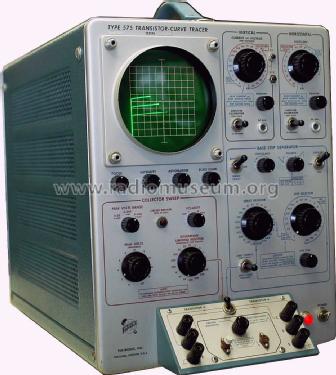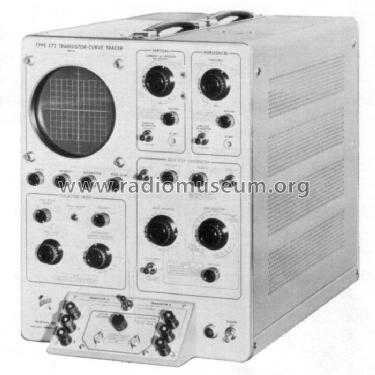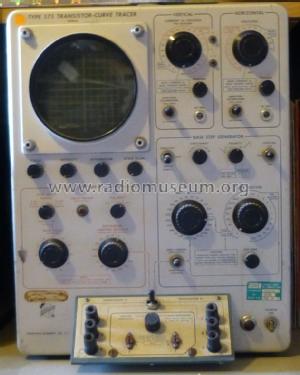Transistor Curve Tracer 575
Tektronix; Portland, OR
- Country
- United States of America (USA)
- Manufacturer / Brand
- Tektronix; Portland, OR
- Year
- 1957–1971
- Category
- Service- or Lab Equipment
- Radiomuseum.org ID
- 116198
- Number of Tubes
- 39
- Number of Transistors
- 2
- Semiconductors
- Wave bands
- - without
- Power type and voltage
- Alternating Current supply (AC) / 105-250 Volt
- Loudspeaker
- - For headphones or amp.
- Material
- Metal case
- from Radiomuseum.org
- Model: Transistor Curve Tracer 575 - Tektronix; Portland, OR
- Shape
- Tablemodel, with any shape - general.
- Dimensions (WHD)
- 13 x 16.7 x 24 inch / 330 x 424 x 610 mm
- Notes
- The 575 Transistor Characteristic Curve Tracer to plot NPN, PNP and diode curves, simulating true operating conditions. Collector supply up to 10 A at 20 V and up to 1 A at 200 V. Base current up to 2.4 A. There is a companion 175 high current unit. There may be multiples of the valves listed. The CRT is not includedin the tube list.
- Net weight (2.2 lb = 1 kg)
- 32 kg / 70 lb 7.8 oz (70.485 lb)
- Price in first year of sale
- 975.00 $
- Mentioned in
- - - Manufacturers Literature
- Literature/Schematics (1)
- Funk-Technik (FT) (11/1959, S. 392 - 395 / Beschreibung)
- Author
- Model page created by Emilio Ciardiello. See "Data change" for further contributors.
- Other Models
-
Here you find 386 models, 374 with images and 92 with schematics for wireless sets etc. In French: TSF for Télégraphie sans fil.
All listed radios etc. from Tektronix; Portland, OR
Collections
The model Transistor Curve Tracer is part of the collections of the following members.
Literature
The model Transistor Curve Tracer is documented in the following literature.
Forum contributions about this model: Tektronix; Portland,: Transistor Curve Tracer 575
Threads: 1 | Posts: 1
When I'd finished the restoration of this magnificent instrument, I noticed what appeared to be a dot-pattern on the trace. This was a mystery, as I didn't recall seeing this when the instrument was first powered.
Extensive investigations yielded nothing: there was no modulation on either the EHT, the grid or the X-plates. However, recalling that the colllector voltage sweep is derived directly from the mains supply (via transformers and an internal variac), I tried addng a 0.47uF X-rated capacitor across the output of the variac (shunt wiper to ground). This largely cured the problem, and confirmed that the noise was mains-derived. Subsequent correspondence with a gentleman in the USA who had exactly the same issue (blog at lazyelectrons.wordpress.com) confirmed the diagnosis; he traced the problem to a modern 9.5W LED lightbulb.
John Sykes, 01.Dec.18









